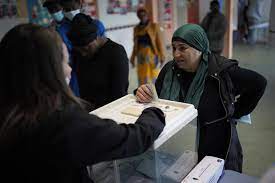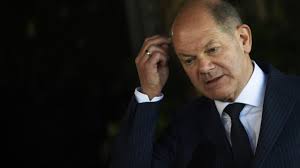
PARIS, April 11 (NNN-AGENCIES) — France faces a brutal two-week campaign over the country’s future, as the centrist incumbent, Emmanuel Macron, faces the far-right Marine Le Pen for the presidency, positioning himself as a pro-European “progressive” against what he calls her anti-Muslim, nationalist programme and “complacency” about Vladimir Putin.
Macron topped Sunday’s first round of the French presidential election with 27.6% of the vote, ahead of Le Pen’s 23%, according to initial projected results by Ipsos for France Télévisions.
He scored higher than his result in the first round five years ago, and clearly gained support in the final hours of the campaign after his harsh warnings to voters to hold back the far right and protect France’s place on the international diplomatic stage amid the war in Ukraine.
But Le Pen’s score was also higher than five years ago. She had steadily gained support after campaigning hard on the cost of living crisis and inflation, which had become voters’ biggest concern.
All major candidates, except for the far-right TV pundit Éric Zemmour, immediately called for French people to vote tactically to keep out Le Pen in the second round.
Macron told reporters: “When the far-right, in all its forms, represents that much in France, you can’t consider things are going well, so you must go out and convince people with a lot of humility, and respect for those who weren’t on our side in this first round.”
He told supporters: “Don’t be mistaken, nothing is decided, and the debate we’ll have in the next two weeks will be decisive for our country and for Europe”.
In her own triumphant speech, Le Pen sought to capitalise on anti-Macron feeling after the gilets jaunes (yellow vests) anti-government protests and styled him as divisive and polarising. She said the final round would be “a fundamental choice between two opposing visions of society”, which she saw as Macron’s “division and disorder” or her promise for “social justice” to protect “society and civilisation”. She called on “all those who did not vote for Macron” to join her.
The hard-left Mélenchon came in third, with a higher-than-forecast 22.2% of the vote, cementing his leading position on the left after campaigning on the cost of living and transforming the presidential system.
As the contest began on Sunday night for both Macron and Le Pen to vacuum up support from the smaller candidates, the choice of Mélenchon’s voters is now key. Mélenchon immediately gave a speech in Paris shouting three times: “Do not give a single vote to Marine Le Pen!” to huge cheers.
The majority of his leftwing supporters five years ago opted to vote for Macron in the second round simply to keep out Le Pen. But polls this time have suggested that a number of them may be tempted to vote Le Pen in protest against Macron.
Zemmour – who holds convictions for incitement to racial hatred and ran as an outsider on an inflammatory, anti-immigration platform – came fourth with 7% of the vote – lower than he had hoped. He immediately called for his voters to back Le Pen.
The biggest shock of the night was the very low score of Valérie Pécresse, the candidate for Nicolas Sarkozy’s traditional rightwing party Les Républicains. She was projected to take less than 5% – a poor showing that is likely to lead to the implosion of her party in favour of its hardliners. This could leave France in a unique position in Europe of not having a traditional mainstream right.
In a speech to supporters, Pécresse said: “[Le Pen’s] historical proximity with Vladimir Putin discredits her from defending the interests of our country in these tragic times. Her election would mean that France would become irrelevant on the European and international scenes. Therefore, and despite my strong disagreement with Macron … I will vote for him in order to stop Marine Le Pen.”
The decline of the traditional parties of government was confirmed by the Socialist party’s candidate and mayor of Paris, Anne Hidalgo, who took only 2% of the vote. The Greens’ Yannick Jadot scored 4.4% despite the environment being among French voters’ top concerns.
The second round on 24 April will now be a replay of Macron and Le Pen’s last bruising election encounter in 2017. But the stakes are much higher than when Macron easily beat Le Pen with 66% of the vote, which was seen as a victory against populist politics after Donald Trump’s election to the US White House and Britain’s vote to leave the EU.
Participation in the first round of the French presidential vote stood at 65 percent at 5 pm on Sunday, the interior ministry said, down sharply from the same point in the 2017 election.
But turnout at this stage was well above the 58.5 percent of April 21, 2002, when Marine’s father, Jean-Marie Le Pen, disproved polls by squeezing past the Socialist prime minister Lionel Jospin to advance to the second round against incumbent president Jacques Chirac.
Chirac went on to win re-election in a crushing defeat of Le Pen, just as Macron beat out Marine Le Pen in the 2017 run-off with 66 percent of the votes to her 34 percent.
Some 48.7 million voters are registered for the election, to be followed by the run-off on April 24. — NNN-AGENCIES







